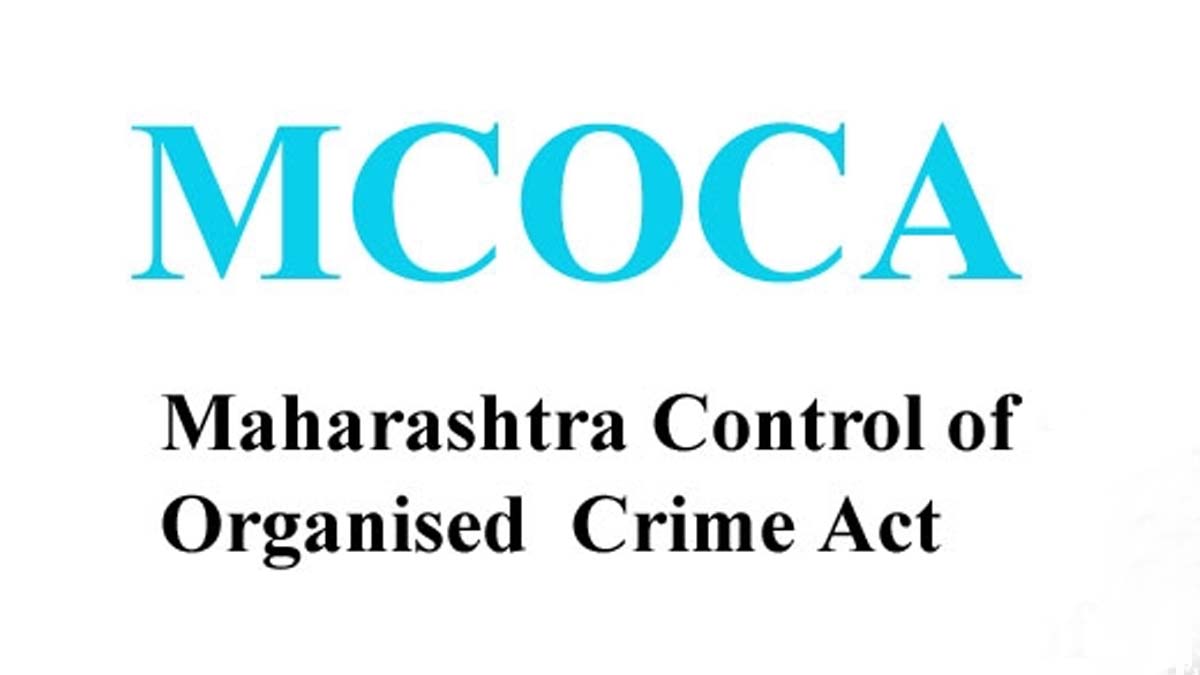
CRIME AGINST STATE ( MOCOCA,TADA,)
Maharashtra Control Of Organized Crime Act, 1999 (MOCOCA)
This act has the aim of combating organized crime more efficiently. After the Governor of Maharashtra was satisfied that circumstances existed that rendered it necessary to take immediate action, this act was promulgated on the 24th February 1999
The main objective for which this act came into existence is to combat crime and terrorism. The preamble of this act is with the view that the existing legal framework and procedure is found to be inadequate to control the menace of organized crime. This act was passes by the assent of the President in 1999 when both the houses were not in session and Governor was satisfied that there is a need to take an immediate action for the purpose aforesaid. Unlike common law, this law has stringent and deterrent provisions including in some circumstances power to intercept wire, electronic or oral communication to control organized crime. Contradicting to common law, confessions before the place officers are admissible under this act and there is not provision for granting bail for 6 months to the accused. Due to increase in number of gangs, criminal groupings, mafia organizations promoting ill evils like illegal trade of narcotics, kidnapping, collection of protection money in Maharashtra, this act was enacted that gives more power to the police.
Organized Crime means any continuing unlawful activity by an individual, singly or jointly, either as a member of an organized crime syndicate or on behalf of such syndicate by using violence, threat of violence or forcing or any other unlawful means with the objective of gaining pecuniary benefits or economic advantage for himself or any other person or promoting any kind of revolt or uprising. This act was enacted to combat organized crime, which was on an increasing verge in our country. It deals with prevention and control of criminal activity by organized crime or gangs in India. The amount of illegal wealth and black money generated from these activities is huge in number and had severe effects on the economy of India. There were large number of organized criminal gangs have been operating and there was an immediate need to restrain their activities. The existing legal framework is inadequate in dealing with this increasing number of crimes. The procedural laws were failing and in order to provide more powers to the police in controlling the non -terror activities, this act came in force. With this view government decided to enact a special law with more stringent and deterrent provisions
Organized Criminals in carrying out their criminal activities make extensive use of wire and oral communication. The interception of such communications to obtain evidence of the commission of crimes or to prevent their commission would be an indispensable aid to law enforcement and the administration of justice. There should be prima facie evidence to believe that there are two or more persons involved in the conspiracy. It deals with the control and prevention of criminal activities by criminal syndicate or gangs. It takes into consideration cases from which pecuniary benefits are taken or favors of monetary gains, which could extend up to insurgency. It punishes promoting insurgency but not insurgency per se. Unlawful activities defined under this act need not to be terrorist attack or insurgency
Terrorist and Disruptive Activities (Prevention) Act (TADA)
Terrorist and Disruptive Activities (Prevention) Act, commonly known as TADA, was an Indian anti-terrorism law which was in force between 1985 and 1995 (modified in 1987) under the background of the Punjab insurgency and was applied to whole of India. It was originally assented to by the President on 23 May 1985 and came into effect on 24 May 1985. This act was intended to halt the Khalistani Movement, a form of religious terrorism present in Punjab. It later expanded to encompass other states as well. The Act had a sunset provision for lapsing after two years post-commencement, which it did on 24 May 1987. The Parliament not being in session, the life of the Act could not be extended. But the provisions were kept alive by an ordinance effective from the expiry date of the Act. This ordinance was later replaced with the Terrorist and Disruptive Activities (Prevention) Act, 1987. It was assented to on 3 September 1987, and made effective in two parts from 24 May 1987 and 3 September 1987. This also had a sunset provision of two years from 24 May 1987. It was renewed in 1989, 1991 and 1993 before being allowed to lapse in 1995 due to increasing unpopularity after widespread allegations of abuse. It was the first anti-terrorism law legislated by the government to define and counter terrorist activities.
The Act's third paragraph gives a very thorough definition of "terrorism":
"Whoever with intent to overawe the Government as by law established or to strike terror in the people or any section of the people or to alienate any section of the people or to adversely affect the harmony amongst different sections of the people does any act or thing by using bombs, dynamite or other explosive substances or inflammable substances or lethal weapons or poisons or noxious gases or other chemicals or by any other substances (whether biological or otherwise) of a hazardous nature in such a manner as to cause, or as is likely to cause, death of, or injuries to, any person or persons or loss of, or damage to, or destruction of, property or disruption of any supplies or services essential to the life of the community, or detains any person and threatens to kill or injure such person in order to compel the Government or any other person to do or abstain from doing any act, commits a terrorist act."

